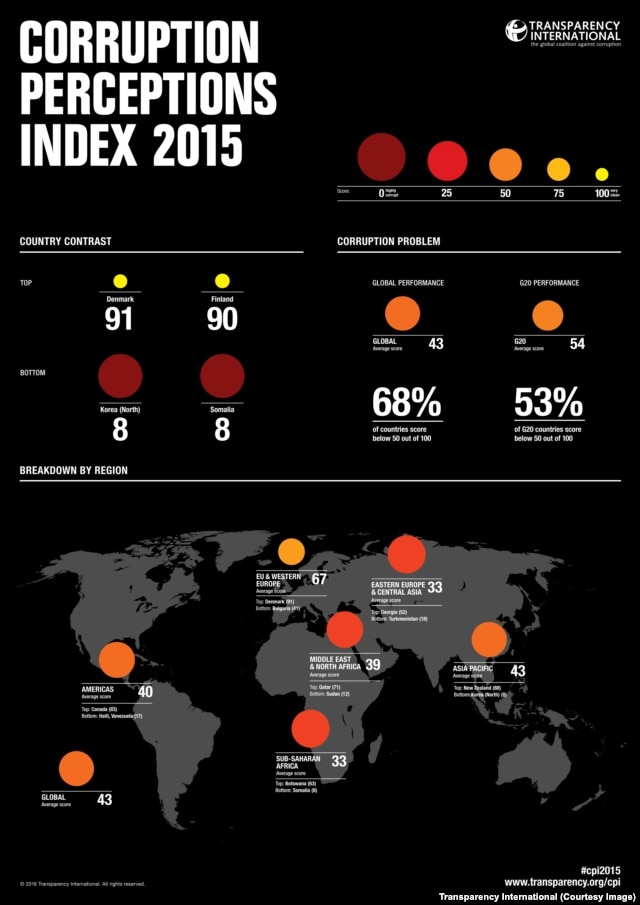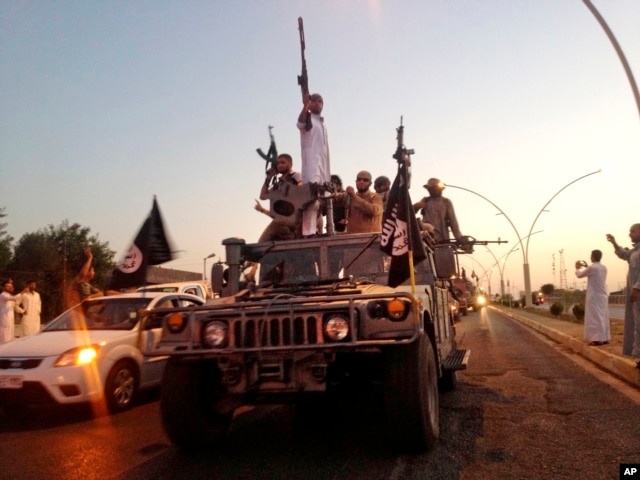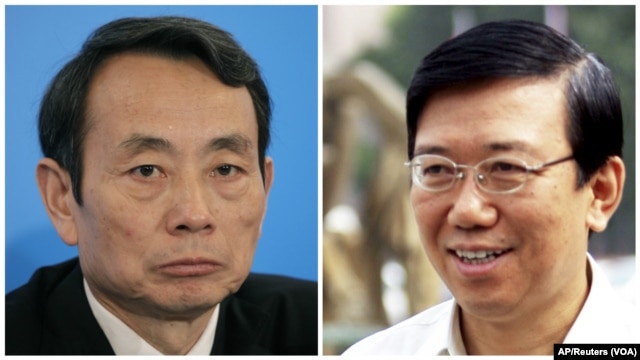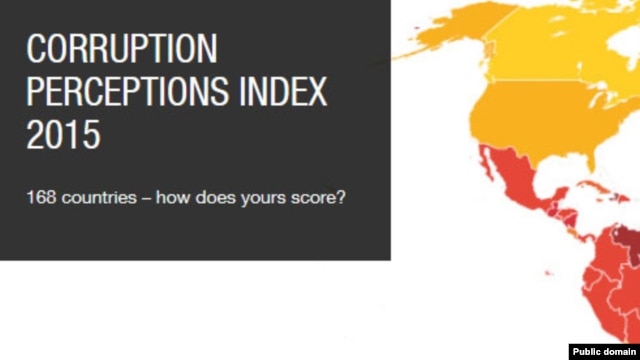Transparency International’s Corruption Index 2015A new report lists Somalia, North Korea and Afghanistan as the most highly corrupt nations on Earth.
Transparency International released its annualCorruption Perceptions Index on Wednesday, relying on what it calls expert opinion from around the world to measure perceived levels of public sector corruption.
Low scores mean more corruption, and the report gave Somalia and North Korea an eight, while putting Afghanistan at 11.
No country scored a perfect 100, but a few came close, with Denmark at 91, and Finland and Sweden each at 90.
‘Blight’ across globe
Jose Ugaz, chair of Transparency International, said the report shows corruption is still a “blight” across the globe. “But 2015 was also a year when people again took to the streets to protest corruption,” he said. “People across the globe sent a strong signal to those in power: It is time to tackle grand corruption.”
“But 2015 was also a year when people again took to the streets to protest corruption,” he said. “People across the globe sent a strong signal to those in power: It is time to tackle grand corruption.”
Transparency International said more than 6 billion people — the vast majority of the global population — are living in countries “with a serious corruption problem.”
‘Serious corruption problem’
The worst performing region is sub-Saharan Africa. Botswana ranks as one of the better countries in the world with a 63, but the report says most of those countries have a “serious corruption problem.”
“In many countries, including low scorers Angola, Burundi and Uganda, we’re seeing a failure to prosecute corrupt public officials on the one hand, and intimidation of citizens who speak out against corruption on the other,” the report says. It calls on governments to make sure the rule of law applies to everyone.
Among the most corrupt nations are countries in the Middle East and North Africa that are dealing with the battle against the Islamic State group and persistent political instability.
Islamic State fighters seized large areas in Iraq and Syria in mid-2014 and have managed to remain in control of major cities despite international military efforts. The report gives Iraq a 16 and Syria an 18 in terms of public corruption. FILE – Fighters from the Islamic State group parade in a commandeered Iraqi security forces armored vehicle down a main road at the northern city of Mosul, Iraq.
FILE – Fighters from the Islamic State group parade in a commandeered Iraqi security forces armored vehicle down a main road at the northern city of Mosul, Iraq.
“The rise of ISIS and the ensuing fight against terrorism have been used by many governments as an excuse to crack down on civil liberties and civil society,” Transparency International says, using an acronym for the militant group. “Far from helping, such an approach means that entrenched corrupt networks go unchallenged, often serving as yet further financial fodder for terrorism.”
Elsewhere in the region, the report scored Libya at 16, Jordan at 53 and noted improvements in Saudi Arabia, particularly with the expanded inclusion of women in politics, giving the country a 52 on the index.
European rankings
In Europe, Transparency International cited concerns about harsh restrictions on civil society and free media in low-scoring countries Azerbaijan, Kazakhstan, Russia and Uzbekistan.
It also expressed worry about “marked deterioration” in Hungary, Macedonia, Spain and Turkey, saying each once had hope for positive change but now has growing corruption and shrinking democracy.
The region has some of the least corrupt nations in the world, but the report says even leaders Denmark, Finland, Sweden and Norway have had major corruption cases in the past year. FILE – Jiang Jiemin, left, former chairman of the state-run China National Petroleum Corp., and Li Chuncheng, right, a former deputy party chief for the southwestern province of Sichuan, were both convicted on corruption charges in Hubei province, China.
FILE – Jiang Jiemin, left, former chairman of the state-run China National Petroleum Corp., and Li Chuncheng, right, a former deputy party chief for the southwestern province of Sichuan, were both convicted on corruption charges in Hubei province, China.
Asia, the report says, is a region united by corruption, yet shows little sign of taking action against it.
“From campaign pledges to media coverage to civil society reforms, corruption dominates discussion.”
Japan easily tops Asian nations with a score of 75, while the index gives China a 37, 35 for the Philippines and 21 for both Cambodia and Myanmar.
Transparency International says countries in the Americas need systemic reform, especially when it comes to making judiciaries free from political influence. It also calls for better regional cooperation to prevent corrupt individuals from hiding in another country.
Canada at 83 is the region’s top scorer, with the United States close behind at 76. Uruguay and Chile also score as some of the least corrupt nations, while Haiti and Venezuela rank near the bottom with scores of 17.
CORRUPTION PERCEPTIONS INDEX 2015
MORE THAN 6 BILLION PEOPLE LIVE IN COUNTRIES WITH A SERIOUS CORRUPTION PROBLEM
Based on expert opinion, the Corruption Perceptions Index measures the perceived levels of public sector corruption worldwide.
Dark red indicates a highly corrupt public sector. Lighter red and orange countries fare a bit better, but corruption among public institutions and employees is still common. Yellow countries are perceived as cleaner, but not perfect.
The scale of the issue is huge. Sixty-eight per cent of countries worldwide have a serious corruption problem. Half of the G20 are among them.
Not one single country, anywhere in the world, is corruption-free.


The 2015 Corruption Perceptions Index clearly shows that corruption remains a blight around the world. But 2015 was also a year when people again took to the streets to protest corruption. People across the globe sent a strong signal to those in power: it is time to tackle grand corruption.José Ugaz,
Chair, Transparency International
WHICH COUNTRIES IMPROVED? WHICH GOT WORSE?
2015 showed that people working together can succeed in fighting corruption. Although corruption is still rife globally, more countries improved their scores in 2015 than declined.
Some countries have improved in recent years – Greece, Senegal and the UK are among those that have seen a significant increase in scores since 2012.
Others, including Australia, Brazil, Libya, Spain and Turkey, have deteriorated.
Dealing with many entrenched corruption issues, Brazil has been rocked by the Petrobras scandal, in which politicians are reported to have taken kickbacks in exchange for awarding public contracts. As the economy crunches, tens of thousands of ordinary Brazilians have lost their jobs already. They didn’t make the decisions that led to the scandal. But they’re the ones living with the consequences.
LOWEST SCORERS CHARACTERISED BY BLOODY AND ENTRENCHED CONFLICT
 Five of the 10 most corrupt countries also rank among the 10 least peaceful places in the world.
Five of the 10 most corrupt countries also rank among the 10 least peaceful places in the world.
In Afghanistan, millions of dollars that should have gone on reconstruction have been reportedly wasted or stolen, seriously undermining efforts to sustain peace.
Even where there’s not open conflict, the levels of inequality and poverty in these countries are devastating.
In Angola, 70 per cent of the population live on US$2 a day or less. One in six children die before the age of five – making it the deadliest place in the world to be a child. More than 150,000 children die each year. But not everyone’s suffering.
Dubbed Africa’s youngest billionaire, Isabel dos Santos made her US$3.4 billion fortune from the national diamond and telecommunications business. She’s also the president’s daughter.

- Africa’s youngest billionaire, worth US$3.4 billion
- Angola has the world’s highest child mortality rate
ARE HIGH SCORING COUNTRIES
EXPORTING CORRUPTION OVERSEAS?
MANY “CLEAN” COUNTRIES HAVE DODGY RECORDS OVERSEAS
 Northern Europe emerges well in the index – it’s home to four of the top five countries.
Northern Europe emerges well in the index – it’s home to four of the top five countries.
But just because a country has a clean public sector at home, doesn’t mean it isn’t linked to corruption elsewhere.
Take Sweden for instance. It comes third in the index, yet the Swedish-Finnish firm TeliaSonera – 37 per cent owned by the Swedish state – is facing allegations that it paid millions of dollars in bribes to secure business in Uzbekistan, which comes in at 153rd in the index.
The company is now pulling out of business in Central Asia, but Sweden isn’t the only “clean” country to be linked to dodgy behaviour overseas. As our research shows, half of all OECD countries are violating their international obligations to crack down on bribery by their companies abroad.
CORRUPTION BREAKDOWN BY REGION
By looking at the regions, certain trends emerge:
“We’ve witnessed two remarkable trends in the Americas in 2015: the uncovering of grand corruption networks and the mass mobilisation of citizens against corruption,” says Alejandro Salas, Transparency International Director for the Americas. “The Petrobras and La Línea scandals are testament to these trends in the two biggest regional decliners: Brazil and Guatemala. The challenge now is to tackle the underlying causes and reduce impunity for corruption.”

“Between Australia’s slipping scores and North Korea’s predictably disastrous performance, this year’s index shows no significant improvement,” notes Srirak Plipat, Director forAsia Pacific. “Has Asia Pacific stalled in its efforts to fight corruption? This year’s poor results demand that leaders revisit the genuineness of their efforts and propel the region forward with actionable measures.”
“While a handful of countries in Europe and Central Asia have improved, the general picture across this vast region is one of stagnation,” warns Anne Koch, Director for Europe and Central Asia. “Also very worrying is the marked deterioration in countries like Hungary, FYR of Macedonia, Spain and Turkey where we’re seeing corruption grow, while civil society space and democracy shrink. Corruption won’t be tackled until laws and regulations are put into action and civil society and the media are genuinely free.”

“Once again, 3 of the bottom 10 countries are from the Middle East and North Africa region – Iraq, Libya and Sudan. The ongoing devastating conflicts in these and other countries inevitably mean that any efforts to strengthen institutions and the state have taken a back seat. Yet security will only succeed long-term if governments make a genuine break with cronyism and build trust with citizens,” says Ghada Zughayar, Director for Middle East and North Africa.
“From Ebola to terrorism, we’ve seen corruption exacerbate crises during 2015 in Sub-Saharan Africa,” says Chantal Uwimana, Director for Sub-Saharan Africa. “Forty out of the region’s 46 countries show a serious corruption problem and there’s no improvement for continent powerhouses Nigeria and South Africa. If corruption and impunity are to ‘be a thing of the past’ as the African Union stated, governments need to take bold steps to ensure rule of law is the reality for everyone.”































